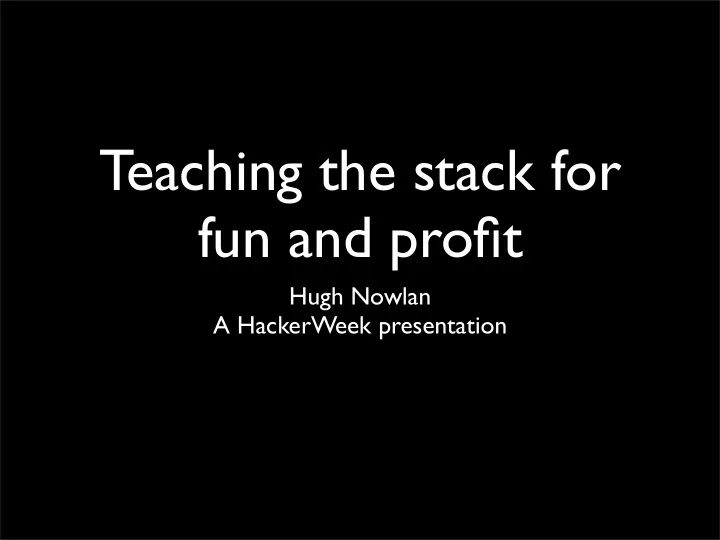

Teaching the stack for fun and profit Hugh Nowlan A HackerWeek presentation
Me • TCD • Grand • DCU • Grand
Warnings • Lecture pertains to IA32 for the most part • No insta-l33t • Frames, pointers, bounds • Stack discipline is boooring • Complex topic
Apology before one is required • Target audience
The stack • Keep track of functions called • Arguments • Where to return to • Local variables • Stored in frames
Stack buffer overflows • Debilitating • Widespread (still) • Easily introduced • Successful exploitation alters control flow • Flow altered via modification of return values
Function execution • Before function execution • Address of next instruction stored • Frame pointer stored • Frame pointer becomes function address • After function execution - ret • Return address popped from stack
Bounds • User controlled input = potential threat • SQL injection, XSS, BoFs • Programming practice should protect • Some core elements are insecure • Input should go into input buffers • Nowhere else...
C checklist • gets • printf • strcpy • memcpy • Others...
Unchecked bounds • Unchecked bounds can mean compromise • What happens here? Inside function x: • input = pointer to 18 bytes of data • destination = 10 byte array local to x • strcpy(destination, input)
Oh no.
What now? • Unsurprisingly, a crash • Function postlude goes ahead unaware • Stored frame pointer becomes “rrrp” • Derp • Let’s boost it a little
Exploitation at last • Input is simply a \x escaped hex memory address • This points to a function from which to return to • Handy if you have the right function • No arguments, calls execl(“/bin/sh”,null);
Best-case • Assuming this function • Get the address (say 0x04112308) • Exploited function executes “ret” • Code “returns” to the exploit • Usually not an option
Shellcode • Expansion of previous technique • Injection of code alongside memory redirection • Encoded assembly instructions to execute exploit code • The shorter your code, the leeter your skilz
Pre-assembly void shellcode(void) { char *execarg[2]; execarg[0] = “/bin/sh”; execarg[1] = NULL; execve(execarg[0],execarg,NULL); }
Preparing payloads • Injecting the code isn’t enough • NOPs used to make up loading space • Buffer location is unclear to attacker
Assembly • Produced assembly is optimised • \xeb\x1f\x5e\xb8\x00\x00\x00\x00\xc7 \x46\x07\x00\x00\x00\x00\x50... • Nulls need to be removed • Strings need to be loaded carefully
Caveats • Executing /bin/sh runs as exploiting user • SUID bit changes this • Program executes as owner • Usually aids less-privileged users • chmod +s aprogram
Prevention • Writing safe code • Non-executable stack • Bounds checking • Stack Guard • Instruction randomisation
Correct code • Easier than it sounds • Cliches appear time and time again • Static analysis can help
Bounds checking • Ensure reads and writes are in-bounds • Only array references • Can’t see variables beyond where they are declared • Some operations slowed by large factors
Randomised instructions • Encrypted executables • On the fly decryption • Most injected code lacks valid instructions • Only protects against injected code • Performance hit
Canaries • Present in GCC 4.x • Augmented function prologues and epilogues • Canary near return address • Value integrity is checked on return
No-exec stack • Non-executable segments in stack • Disable execute on all but .text • Code section • Still vulnerable to • Data modification • Existing dangerous code
Prognosis • Grim • Only you etc. etc.
Further reading • “Smashing the Stack for Fun and Profit” • Aleph One • Real world examples! • exploit-db • Shellcode archive
Reading is only so entertaining • intruded.net • Great for learning • overthewire.org • A little more advanced
kthxbai • Questions? • Presentation available soon • http://www.netsoc.tcd.ie/~nosmo
Recommend
More recommend